河南省周口市名校2013-2014学年高一英语3月联考试题
高中英语真题-2013—2014学年度上学期模块三高一英语试题

高中英语真题:2013—2014学年度上学期模块三高一英语试题本试卷分为第一卷(选择题)和第二卷(非选择题)两部分。
满分150分。
考试时间120分钟。
第一卷第一部分:听力(共两节,满分20分)第一节(共5小题;每小题1分,满分5分)听下面五段对话。
每段对话后有一个小题,从题中所给的A、B、C三个选项中选出最佳选项,并标在试卷的相应位置。
听完每段对话后,你都有10秒钟的时间来回答有关小题和阅读下一小题。
每段对话仅读一遍。
1. How many kinds of sports does the man like?A. 2.B. 3.C. Mo re than 4.2. Will the man buy the bike?A. No, he won’t. It is too expensive.B. Yes, he will. The man wants it.C. Yes, he will. He likes the colour.3. Which day is Mary’s birthday?A. October 18th.B. October 15th.C. October 21st.4. What time is it?A. 3:57.B. 4:00.C. 4:03.5. What did the man expect?A. Jane can call instead of write.B. He expected Jane to spend the summer holiday with them.C. He expected to travel in with Jane.第二节(共15题;每小题1分,满分15分)听下面五段对话或独白。
每段对话或独白后有几个小题,从题中所给的A、B、C三个选项中选出最佳选项,并标在试卷的相应位置。
听每段对话或独白前,你将有时间阅读各个小题,每小题5秒钟;听完后,各小题将给出5秒钟的作答时间。
高中英语真题-2013-2014学年高一上学期期中联考
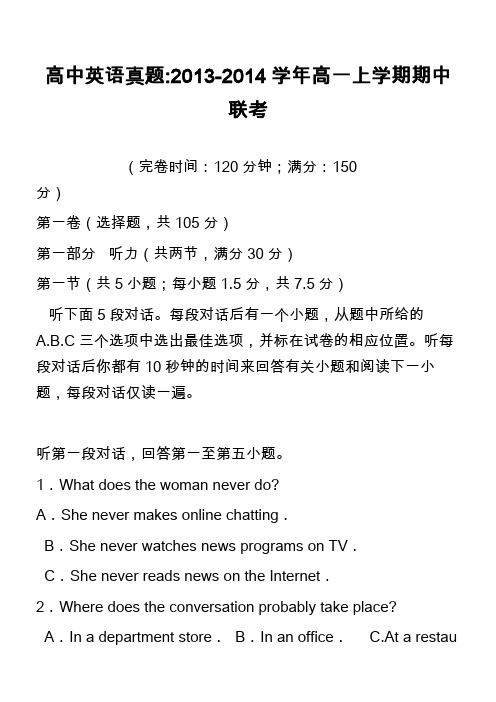
高中英语真题:2013-2014学年高一上学期期中联考(完卷时间:120分钟;满分:150分)第一卷(选择题,共105分)第一部分听力(共两节,满分30分)第一节(共5小题;每小题1.5分,共7.5分)听下面5段对话。
每段对话后有一个小题,从题中所给的A.B.C三个选项中选出最佳选项,并标在试卷的相应位置。
听每段对话后你都有10秒钟的时间来回答有关小题和阅读下一小题,每段对话仅读一遍。
听第一段对话,回答第一至第五小题。
1.What does the woman never do?A.She never makes online chatting.B.She never watches news programs on TV.C.She never reads news on the Internet.2.Where does the conversation probably take place?A.In a department store. B.In an office. C.At a restaurant.3.Why doesn’t the man eat his cake?A.Because he wants to save it.B.Because he has a toothache.C.Because he doesn’t like the taste.4.What can we learn from the conversation?A.Ellen is not in the office.B.Becky is Ellen’s best friend.C.Bobby dialed the wrong number.5.How much did the shoes cost originally(最初)?A.60 dollars. B.90 dollars. C.120 dollars.第二节:(共15小题; 每题1.5分 ,共22.5分)听下面5段对话或独白。
河南周口中英文学校2013-2014学年高一上学期第三次月考试题(英语)【解析版】

第二部分:英语知识运用(共两节,满分45分)第一节:单项填空(共15小题, 每小题1分,满分15分)从A、B、C、D 四个选项中,选出可以填入空白处的最佳选项,并在答题卡上将该项涂黑21.After the class was over,Li Ping apologized ________ the teacher ________ his coming late.A.for; to B.because; to C.to; because D.to; for22. The government tried its best to _____ the people’s needs, but the people were still not_______. In fact, what the government did was not________.A. satisfy; satisfied; satisfyingB. satisfy; satisfying; satisfiedC. satisfied; satisfied; satisfyingD. satisfying; satisfied; satisfied23. —Isn’t that Ann’s husband over there?—No, it ______ be him-I’m sure he doesn’t wear glasses.A. can’tB. must notC. won’tD. may not24. In the past twenty years, the sad father has been to many places-______his lost son.A. in face ofB. in favor ofC. in charge ofD. in search of25. -----What did you think of Mount Tai?------Wonderful. It’s worth ______once again.A. being visitedB. to visitC. visitingD. visited26. The math problem seems very easy, but in fact it is very difficult_______.A. to work outB. being worked outC. working outD. to be worked out.【答案】A【解析】试题分析:考查非谓语动词。
高中英语真题-2013——2014学年高三第一次月考

高中英语真题:2013——2014学年高三第一次月考本卷分选择题和非选择题两部分,满分150分。
考试用时120分钟。
第一卷(选择题共115分)I:听力(共两节,满分30分)第一节(共5小题;每小题1.5分,满分7.5分)请听下面5段对话, 选出最佳选项。
每段对话仅读一遍。
1. Where does the conversation most probably take place?A. In a park.B. In a zoo.C. In a pet store.2. What does the woman mean?A. Things here are very cheap.B. Things here are not cheap.C. She doesn’t know whether things here are cheap or not.3. Where are the two speakers going to plant the tree?A. By the front door.B. At the back of the garage.C. A t the end of the garden.4. Where does the conversation take place?A. In a shop.B. In a hotel.C. In a restau rant.5. What do we learn from the conversation?A. The man went to during Christmas.B. The man visited during the summer holiday.C. The man’s parents live in .第二节(共15小题; 每小题1.5分,满分22.5分)请听下面5段对话或独白,选出最佳选项。
每段对话或独白读两遍。
高中英语真题-2014届高三年级第三次调研测试英语试卷
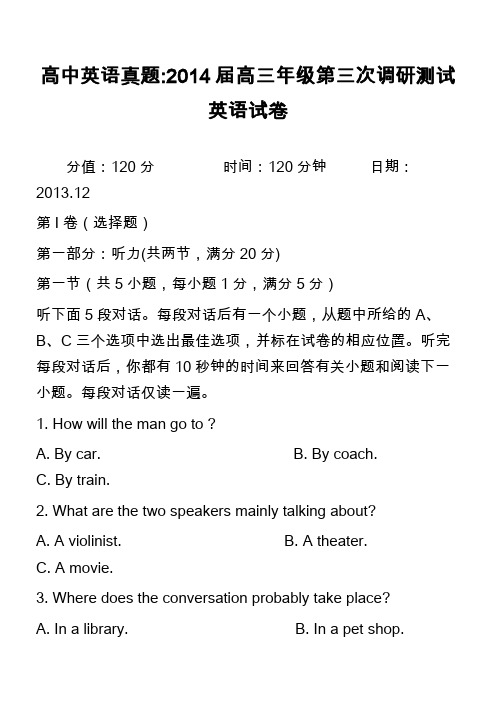
高中英语真题:2014届高三年级第三次调研测试英语试卷分值:120分时间:120分钟日期:2013.12第I 卷(选择题)第一部分:听力(共两节,满分20分)第一节(共5小题,每小题1分,满分5分)听下面5段对话。
每段对话后有一个小题,从题中所给的A、B、C三个选项中选出最佳选项,并标在试卷的相应位置。
听完每段对话后,你都有10秒钟的时间来回答有关小题和阅读下一小题。
每段对话仅读一遍。
1. How will the man go to ?A. By car.B. By coach.C. By train.2. What are the two speakers mainly talking about?A. A violinist.B. A theater.C. A movie.3. Where does the conversation probably take place?A. In a library.B. In a pet shop.C. In a bookstore.4. What does the woman want to do?A. Get a new dress.B. Have her dress short ened.C. Try on the dress tomorrow morning.5. What does the man mean?A. Tom is very helpful.B. Tom d oesn’t keep his word.C. Tom is unable to repair a computer.第二节(共15小题;每小题1分,满分15分)听下面5段对话或独白。
每段对话或独白后有几个小题,从题中所给的A、B、C三个选项中选出最佳选项,并标在试卷的相应位置。
听每段对话或独白前,你将有时间阅读各个小题,每小题5秒钟;听完后,每小题将给出5秒钟的作答时间。
2013年河南省十所名校高三第三次联考英语试题及答案
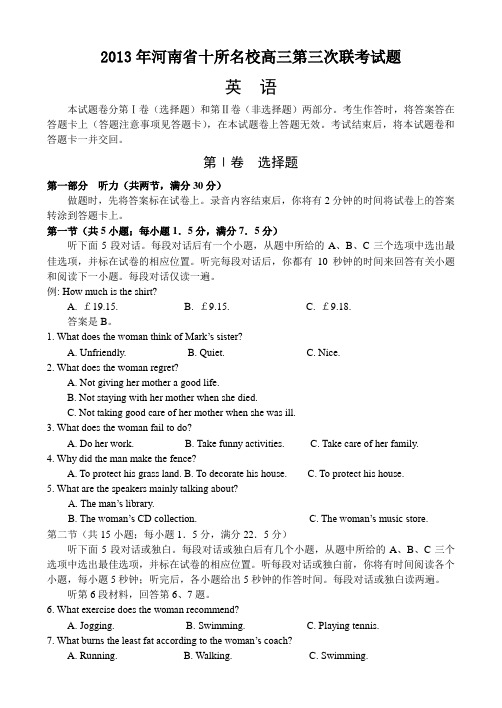
2013年河南省十所名校高三第三次联考试题英语本试题卷分第Ⅰ卷(选择题)和第Ⅱ卷(非选择题)两部分。
考生作答时,将答案答在答题卡上(答题注意事项见答题卡),在本试题卷上答题无效。
考试结束后,将本试题卷和答题卡一并交回。
第Ⅰ卷选择题第一部分听力(共两节,满分30分)做题时,先将答案标在试卷上。
录音内容结束后,你将有2分钟的时间将试卷上的答案转涂到答题卡上。
第一节(共5小题;每小题1.5分,满分7.5分)听下面5段对话。
每段对话后有一个小题,从题中所给的A、B、C三个选项中选出最佳选项,并标在试卷的相应位置。
听完每段对话后,你都有10秒钟的时间来回答有关小题和阅读下一小题。
每段对话仅读一遍。
例: How much is the shirt?A. £19.15.B. £9.15.C. £9.18.答案是B。
1. What does the woman think of Mark’s sister?A. Unfriendly.B. Quiet.C. Nice.2. What does the woman regret?A. Not giving her mother a good life.B. Not staying with her mother when she died.C. Not taking good care of her mother when she was ill.3. What does the woman fail to do?A. Do her work.B. Take funny activities.C. Take care of her family.4. Why did the man make the fence?A. To protect his grass land.B. To decorate his house.C. To protect his house.5. What are the speakers mainly talking about?A. The man’s library.B. The woman’s CD collection.C. The woman’s music store.第二节(共15小题;每小题1.5分,满分22.5分)听下面5段对话或独白。
高中英语真题-2013~2014学年第一学期入学考试试卷高三英语
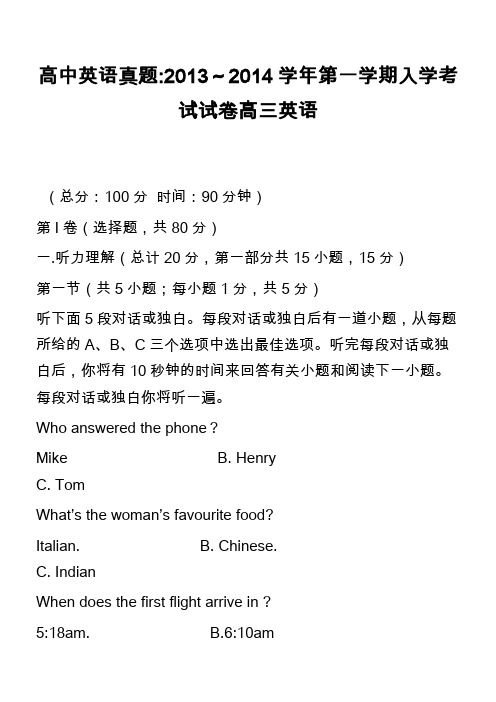
高中英语真题:2013~2014学年第一学期入学考试试卷高三英语(总分:100分时间:90分钟)第I卷(选择题,共80分)一.听力理解(总计20分,第一部分共15小题,15分)第一节(共5小题;每小题1分,共5分)听下面5段对话或独白。
每段对话或独白后有一道小题,从每题所给的A、B、C三个选项中选出最佳选项。
听完每段对话或独白后,你将有10秒钟的时间来回答有关小题和阅读下一小题。
每段对话或独白你将听一遍。
Who answered the phone?Mike B. HenryC. TomWhat’s the woman’s favourite food?Italian. B. Chinese.C. IndianWhen does the first flight arrive in ?5:18am. B.6:10amC.8:50amWhat is the woman looking for?Zoo B. TelephoneC. Tennis courtWhat will the weather be like at the weekend?Cloudy. B. Snowy.C. Sunny第二节(共10小题,每小题1分,共10分)听下面4段对话或独白,每段对话或独白后有几道小题,从每题所给的A、B、C三个选项中选出最佳选项。
听每段对话或独白前,你将有5秒钟的时间阅读每小题。
听完后,每小题将给出5秒钟的作答时间。
每段对话或独白你将听两遍。
听第6段材料,回答第6至7题。
Where are the two speakers?In the hotel B In a shopC. In a restaurantHow much did the man pay in the end?$115. B. $130C. $140听第7段材料,回答第8至9题。
What did the man do last weekend?Watched TV. B. Stayed at home.C. Visited a friendWhat will the woman probably do this weekend?Play tennis. B. Do some shoppingC. Go to a dance听第8段材料,回答第10至12题。
高中英语真题-2013-2014学年高一英语上学期第三次月考试题新人教版

高中英语真题:2013-2014学年高一英语上学期第三次月考试题新人教版第一部分:听力(满分30分,每小题1.5分)听下面5段对话。
每段对话后有一个小题,从题中所给的A、B、C三个选项中选出最佳选项,并标在试卷的相应位置。
听完每段对话后,你都有10秒钟的时间来回答有关小题和阅读下一小题。
每段对话仅读一遍。
1. What is the man doing?A. Trying to find a jobB. Designing job advevtisementC. Surfing the Internet2. What will the woman do?A. Take her food awayB. Have food in the restaurantC. Ord er a large coffee3. Why is the man so excited?A. He will travel toB. His parents are coming back next monthC. He can’t wait to go to4. What did the man do?A. He drove too fastB. He ran the red lightC. He made a wrong turn5. Where is the book now?A. In Mike’s roomB. In the woman’s officeC. In the wo man’s car第二节听下面5段对话或独白。
每段对话或独白后有几个小题,从题中所给的A、B、C三个选项中选出最佳选项,并标在试卷的相应位置。
听每段对话或独白前,你将有时间阅读各个小题,每小题5秒钟;听完后,各个小题将给出5秒钟的作答时间。
每段对话或独白读两遍。
听第6段材料,回答第6、7题。
6. Why is the man unhappy?A. The woman never cleans the roomB. He lost this iPhoneC. The room is in disorder7. What does the woman say about her iPhone?A. She needed it urgently.B. She was looking for it yesterdayC. She had to make an emergency call with it听第7段材料,回答第8、9题。
河南省周口市中英文学校2013-2014学年下学期高一年级第三次月考英语试卷
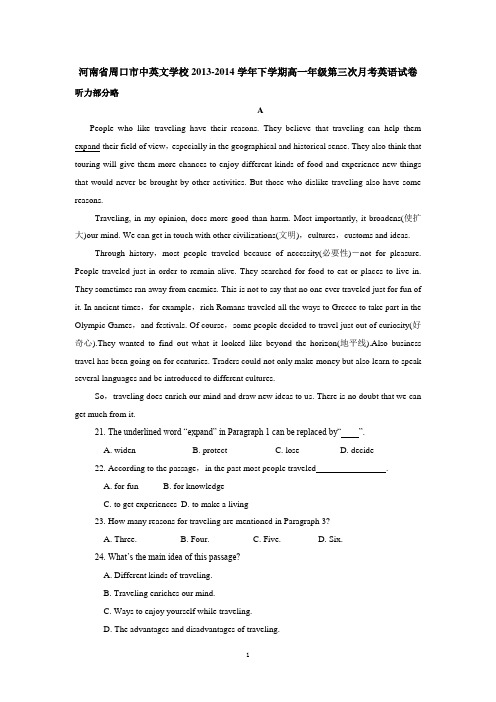
河南省周口市中英文学校2013-2014学年下学期高一年级第三次月考英语试卷听力部分略APeople who like traveling have their reasons. They believe that traveling can help them expand their field of view,especially in the geographical and historical sense. They also think that touring will give them more chances to enjoy different kinds of food and experience new things that would never be brought by other activities. But those who dislike traveling also have some reasons.Traveling, in my opinion, does more good than harm. Most importantly, it broadens(使扩大)our mind. We can get in touch with other civilizations(文明),cultures,customs and ideas.Through history,most people traveled because of necessity(必要性)-not for pleasure. People traveled just in order to remain alive. They searched for food to eat or places to live in. They sometimes ran away from enemies. This is not to say that no one ever traveled just for fun of it. In ancient times,for example,rich Romans traveled all the ways to Greece to take part in the Olympic Games,and festivals. Of course,some people decided to travel just out of curiosity(好奇心).They wanted to find out what it looked like beyond the horizon(地平线).Also business travel has been going on for centuries. Traders could not only make money but also learn to speak several languages and be introduced to different cultures.So,traveling does enrich our mind and draw new ideas to us. There is no doubt that we can get much from it.21. The underlined word “expand” in Paragraph 1 can be replaced by“”.A. widenB. protectC. loseD. decide22. According to the passage,in the past most people traveled .A. for funB. for knowledgeC. to get experiencesD. to make a living23. How many reasons for traveling are mentioned in Paragraph 3?A. Three.B. Four.C. Five.D. Six.24. What’s the main idea of this passage?A. Different kinds of traveling.B. Traveling enriches our mind.C. Ways to enjoy yourself while traveling.D. The advantages and disadvantages of traveling.BIs there anything more important than health? I don’t think so. “Health is the greatest wealth(财富),” wise people say. You can’t be good at your studies or work well when you are ill.If you have a headache, toothache, backache, earache or bad pain in the stomach, if you complain of a bad cough, if you run a high temperature and have a bad cold, or if you suffer from high or low blood pressure, I think you should go to the doctor.The doctor will examine your throat, feel your pulse, test your blood pressure, take your temperature, sound your heart and lungs, test your eyes, check your teeth or have your chest X-rayed. After that he will advise some treatment, or some medicine. The only thing you have to do is to follow his advice.Speaking about doctor’s advice, I can’t help telling you a funny story.An old gentleman came to see the doctor. The man was very ill. He told the doctor about his weakness, memory loss and serious problems with his heart and lungs. The doctor examined him and said there was no medicine for his disease.He told his patient to go to a quiet place for a month and have a good rest. He also advised him to eat a lot of meat, drink two glasses of red wine every day and take long walks. In other words, the doctor advised him to follow the rule “Eat at pleasure, drink with measure and enjoy life as it is.” The doctor also said that if the man wanted to be well again, he shouldn’t smoke more than one cigarette a day.A month later the gentleman came into the doctor’s office. He looked cheerful and happy. He thanked the doctor and said that he had never felt a healthier man.“But you know, doctor,” he said, “it’s not easy to begin smoking at my age.”25. The writer thinks that .A. health is more important than wealthB. work is as important as studiesC. medicine is more important than pleasureD. nothing is more important than money26. The doctor usually tells his patient what to do .A. without examining the patientB. after he has examined the patientC. if the patient doesn’t take medicineD. unless the patient feels pain27. The underlined part means “”.A. he was feeling better than everB. he wasn’t a healthy manC. he was feeling worse than beforeD. he will be well again28. Which of the following is NOT true?A. The doctor usually tests his/her blood pressure when a person is ill.B. The man told the doctor he couldn’t remember things.C. The man thanked the doctor.D. The man didn’t follow the doctor’s advice.CIt is common to consider learning as something that takes place in school,but much of human learning occurs outside the classroom,even from birth and people continue to learn throughout their lives.Even before they enter school,young children learn to walk,to talk and to use their hands to use toys,food,and other objects.They use all of their senses to learn about the sights,sounds,tastes and smells in their environments.They learn how to communicate with their parents,grandparents,siblings,friends and other people important to their world.When they enter school,children learn basic academic subjects such as reading,writing and mathematics.They also continue to learn a great deal outside the classroom.They learn which behaviors are likely to be rewarded and which are likely to be punished.They learn social skills for communicating with other children.After they finish school,people must learn to deal with the many major changes that affect their lives,such as getting married,raising children,and finding and keeping a job.Because learning continues throughout our lives and affects almost everything we do,the study of learning is important in many different fields.Teachers need to understand the best ways to educate children.Psychologists,social workers,criminologists,and other human-service workers need to understand how certain e xperiences change people’s behaviors.Employers,politicians,and advertisers make use of the principles of learning to affect the behavior of workers,voters,and consumers.Learning is closely related to memory,which is the storage of information in the brain.Psychologists who study memory are interested in how the brain stores knowledge,where this storage takes place,and how the brain later outputs knowledge when we need it.In contrast,psychologists who study learning are more interested in behavior and how behavior changes as a result of a person’s experiences.29.The author thinks “learning” in the passage most refers to ________.A.life-long learningB.family learningC.learning after graduationD.behavior learning30.The underlined word “siblings” in the second paragraph probably means ________.A.teachers B.classmatesC.doctors D.brothers or sisters31.Which period of children’s life do they begin to learn how to behave well according to the passage?A.After they go into society.B.Before they enter school.C.When they are at school.D.Before they are born.32.Which of the following is NOT right according to the passage?A.As a matter of fact,learning begins with formal school education.B.Teachers need to understand the best ways to educate their students.C.People need to understand how certain experiences change their behaviors.D.Employers should study the principles of learning to manage their workers well.DIn the US, people prefer waiting for a table to sitting with people they don’t kn ow. This means a hostess may not seat a small group until a small table is available, even if a large one is. If you are sitting at a table with people you don’t know, it is impolite to light up a cigarette without first asking if it will disturb them.At American restaurants and coffee shops you are usually served tap (水龙头)water before you order. You may find the bread and butter is free, and if you order coffee, you may get a free refill(重续).Most cities and towns have no rules about opening and closing time for stores or restaurants, though they usually do make rules for bars. Especially in large cities, stores may be open 24 hours a day.Serving in restaurants is often large; too large for many people. If you can’t finish your meal but would like to enjoy the food later, ask your waitress or waiter for a “doggie bag”. It may have a picture of a dog on it, but everybody knows you’re taking the food for yourself.Tips are not usually added to the check. They are not included in the price of the meal, either.A tip of about 15% is expected and you should leave it on the table when you leave. In some restaurants, a check is brought on a plate and you put your money there. Then the waiter or waitress brings you your change.34.What is served before you order?A. Cold water.B. Butter.C. Coffee.D. Bread.35. What do American people always do when servings are too large for them?A. They take the food home with a doggie bag for their dogs.B. They leave the food on the table and go away.C. They take the food home with a doggie bag and enjoy the food later.D. They ask the waitress or waiter to keep the food for them.第二节(共5小题;每小题2分,满分10分)根据短文内容,从短文后的选项中选出能填入空白处的最佳选项。
高中英语真题-2013-2014学年度高中一年级学业水平考试

高中英语真题:2013-2014学年度高中一年级学业水平考试本试卷共10页,四大题,满分135分。
考试用时120分钟。
注意事项:1.答卷前,考生务必用黑色字迹的钢笔或签字笔将自己的校名、姓名和考生号、试室号、座位号填写在答题卷上。
2.选择题每小题选出答案后,用2B铅笔把答题卷上对应题目选项的答案信息点涂黑,如需改动,用橡皮擦干净后,再选涂其他答案,答案不能答在试卷上。
3.非选择题必须用黑色字迹钢笔或签字笔作答,答案必须写在答题卷各题目指定区域内相应位置上;如需改动,先划掉原来的答案,然后再写上新的答案;不准使用铅笔和涂改液。
不按以上要求作答的答案无效。
4.考生必须保持答题卷的整洁。
I. 语言知识及运用(共两节,满分45分)第一节完形填空(共15小题; 每小题2分,满分30分)阅读下面短文,掌握其大意。
然后从1~15各题所给的四个选项(A、B、C和D)中,选出最佳选项,并在答题卷上将该项涂黑。
March 21st is World Sleep Day. This year’s slogan is “BreatheEasily, Sleep Well”. It1 to celebrate the benefits of good and healthy sleep. Sleep is like food for the2 . Enough sleep helps the body and brain grow and3 . According to the National Sleep Foundation in the ,4 need seven to nine hours of sleep every night. For students age d 10 to 17, a5 amount is about eight to nine hours per night .But many students don’t get 6 sleep because of early schoo l start times and heavy 7 . About 80 percent of middle school students don’t get enough sleep, the China Youth and reporte d. For some students, they want to sleep 8 , but they keep w orrying about their schoolwork and can’t fall asleep 9 . For oth ers, they may even have insomnia (失眠症), which might keep them 10 all night.These sleeping problems greatly 11 people’s life. Experts h ave shown that lack of sleep for teenagers leads to poor 12 . Students without enough sleep cannot13 in class or do well in sports. Also, the lack of sleep may make them depressed.Research shows that with 14 sleep habits it is easier to fall a sleep. Some of these good habits include 15 drinks that make people excited late in the day, going to sleep at the same tim e each night, and sleeping in a comfortable place that is dark, q uiet, and neither too hot nor too cold.1. A. takes B. comes C. aims D. helps2. A. soul B. brain C. heart D. stomach3. A. develop B. digest C. harvest D. fight4. A. children B. teachers C. experts D. adults5. A. healthy B. valuable C. effective D. possible6. A. good B. enough C. sound D. long7. A. housework B. research C. homeworkD. exams8. A. well B. late C. early D. soon9. A. immediatelyB. latelyC. recentlyD. greatly10. A. awake B. alone C. asleep D. active11. A. change B. improve C. damage D. affect12. A. figures B. moods C. tests D. grades13. A. attend B. develop C. concentr D. absentate14. A. general B. good C. strict D. ordinary15. A. arranging B. preparingC. involvingD. avoiding第二节语法填空(共10小题,每小题1.5分,满分15分)阅读下面短文,根据上下文填入适当的词语,或使用括号中的词语的适当形式填空,并将答案填写在答题卷上标号为16~25的相应位置。
高中英语真题-2013-2014学年度第一学期高一月考
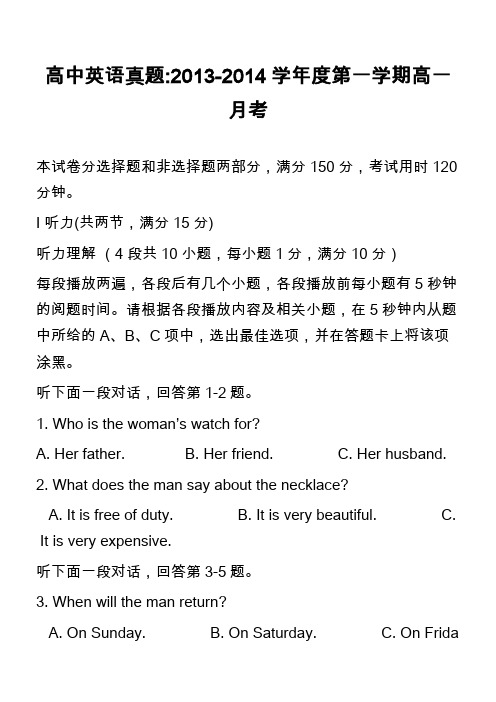
高中英语真题:2013-2014学年度第一学期高一月考本试卷分选择题和非选择题两部分,满分150分,考试用时120分钟。
I 听力(共两节,满分15分)听力理解(4段共10小题,每小题1分,满分10分)每段播放两遍,各段后有几个小题,各段播放前每小题有5秒钟的阅题时间。
请根据各段播放内容及相关小题,在5秒钟内从题中所给的A、B、C项中,选出最佳选项,并在答题卡上将该项涂黑。
听下面一段对话,回答第1-2题。
1. Who is the woman’s watch for?A. Her father.B. Her friend.C. Her husband.2. What does the man say about the necklace?A. It is free of duty.B. It is very beautiful.C. It is very expensive.听下面一段对话,回答第3-5题。
3. When will the man return?A. On Sunday.B. On Saturday.C. On Friday.4. How much will the man pay for his journey?A. $850.B. $815.C. $425.5. What do we know about the man’s journey from the conversa tion?A. Drinking is not allowed.B. It will be serving lunch.C. He can enjoy a video program.听下面一段对话,回答第6-8题。
6. How did the speaker and Dave become friends?A. They lived near each other.B. They met when they were children.C. They used to play on the same football team.7. What do the speaker and Dave have in common?A. Their jobs.B. Their hobbies.C. Their taste in clothes.8. What do we know about Dave?A. He isn’t a good listener.B. He is a troublemaker.C. He is always late.听下面一段对话,回答第9-10题。
高中英语真题-2013-2014学年下学期第三阶段高一英语必修三模块试卷
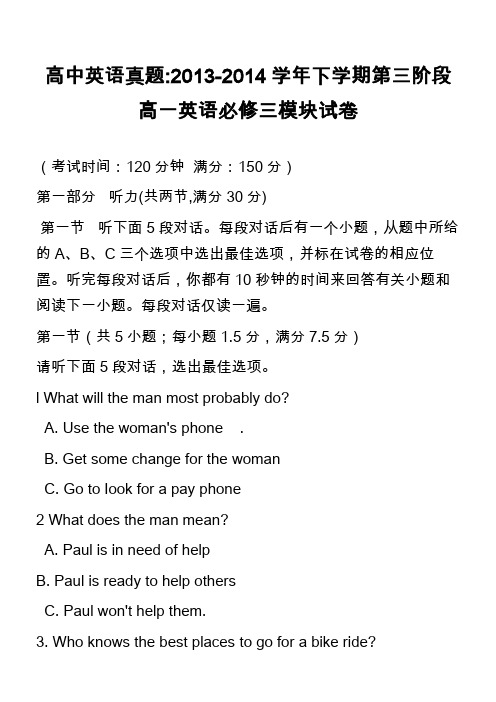
高中英语真题:2013-2014学年下学期第三阶段高一英语必修三模块试卷(考试时间:120分钟满分:150分)第一部分听力(共两节,满分30分)第一节听下面5段对话。
每段对话后有一个小题,从题中所给的A、B、C三个选项中选出最佳选项,并标在试卷的相应位置。
听完每段对话后,你都有10秒钟的时间来回答有关小题和阅读下一小题。
每段对话仅读一遍。
第一节(共5小题;每小题1.5分,满分7.5分)请听下面5段对话,选出最佳选项。
l What will the man most probably do?A. Use the woman's phone .B. Get some change for the womanC. Go to Iook for a pay phone2 What does the man mean?A. Paul is in need of helpB. Paul is ready to help othersC. Paul won't help them.3. Who knows the best places to go for a bike ride?A Harry.B MikeC Linda4. Where will the woman go first?A. Her house.B. A bank.C.A telephone booth.5 What are the two speakers mainly talking about?A. Scuba diving. B The spring break.C.A nice hotel.第二节(共15小题;每小题1.5分.满分22.5分)请听下面5段对话或独白,选出最佳选项请听第6段材料,回答第6、7题。
6 What is the man probably doing?A. Surfing the net.B. Having a meetingC. Reading a book.7. How does the woman probably feel at the end of the conversation?A. BoredB. Happy C.Angry请听第7段材料,回答第8.9题。
高中英语真题-2013~2014学年第二学期高三第一次月考试题

高中英语真题:2013~2014学年第二学期高三第一次月考试题考查时间:120分钟考查内容:大综合第一部分听力(共两节,满分10分)第一节(共5小题,每小题0.5分,满分2.5分)听下面五段对话。
每段对话后有一个小题,从题中所给的A、B、C三个选项中选出最佳选项,并标在试卷的相应位置。
听完每段对话后,你都有10秒钟的时间来回答有关小题和阅读下一小题。
每段对话仅读一遍。
1. Where are the speakers?A. In a car.B. On a planeC. On a train.2. What did the man do?A. He got some moneyB. He checked on something.C. He stopped at a traffic light.3. What does the number refer to?A. A telephone number.B. A room number.C. A ticket number.4. What is the man doing?A. Painting the walls.B. Building a small house.C. Fixing the top of the house.5. What does the woman mean?A. She agrees with the man.B. She doesn’t know Kim.C. Kim doesn’t deserve to be on the committee.第二节(共15小题; 每小题.0.5分,满分7.5分)听下面5段对话。
每段对话后有几个小题,从题中所给的A、B、C三个选项中选出最佳选项,并标在试卷的相应位置。
每段对话读两遍。
听第6段材料.回答第6至7题。
6. What is the relationship between the speakers?A. Teacher and student.B. Doctor and patient.C. Director and actor.7. How will the woman get home?A. She will drive herself.B. She will take the bus.C. She will get a ride from the man.听第7段材料.回答第8至9题。
河南省周口市重点高中2013-2014学年高一下学期五月联考试题 英语 含答案
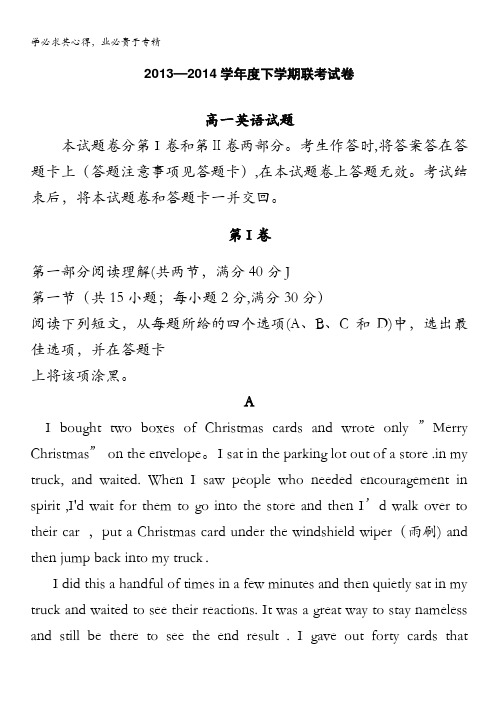
2013—2014学年度下学期联考试卷高一英语试题本试题卷分第I卷和第Ⅱ卷两部分。
考生作答时,将答案答在答题卡上(答题注意事项见答题卡),在本试题卷上答题无效。
考试结束后,将本试题卷和答题卡一并交回。
第I卷第一部分阅读理解(共两节,满分40分J第一节(共15小题;每小题2分,满分30分)阅读下列短文,从每题所给的四个选项(A、B、C和D)中,选出最佳选项,并在答题卡上将该项涂黑。
AI bought two boxes of Christmas cards and wrote only ”Mer ry Christmas” on the envelope。
I sat in the parking lot out of a store .in my truck, and waited. When I saw people who needed encouragement in spirit ,I'd wait for them to go into the store and then I’d walk over to their car ,put a Christmas card under the windshield wiper(雨刷) and then jump back into my truck.I did this a handful of times in a few minutes and then quietly sat in my truck and waited to see their reactions. It was a great way to stay nameless and still be there to see the end result . I gave out forty cards thatafternoon。
There are a few reactions that made them all worth more than I ever could have imagined。
高中英语真题-学2013-2014学年高一英语下学期第一次质量检测(3月)试卷
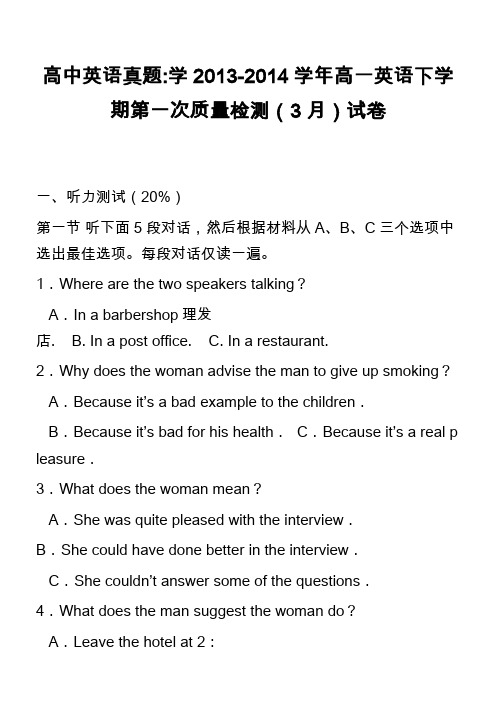
高中英语真题:学2013-2014学年高一英语下学期第一次质量检测(3月)试卷一、听力测试(20%)第一节听下面5段对话,然后根据材料从A、B、C三个选项中选出最佳选项。
每段对话仅读一遍。
1.Where are the two speakers talking?A.In a barbershop理发店. B. In a post office. C. In a restaurant.2.Why does the woman advise the man to give up smoking? A.Because it’s a bad example to the children.B.Because it’s bad for his health. C.Because it’s a real p leasure.3.What does the woman mean?A.She was quite pleased with the interview.B.She could have done better in the interview.C.She couldn’t answer some of the questions.4.What does the man suggest the woman do?A.Leave the hotel at 2:00 P. m.. B.Go there 2 hours earlier.C.Avoid the rush hours traffic.5.Where has the man been?A.. B.. C.Both A and B.第二节听下面5段对话或独白,然后根据材料从A、B、C三个选项中选出最佳选项,每段对话或独白读两遍。
听第6段材料,回答第6至8题。
6.What’s the possible relationship between the two speakers ?A.Father and mother. B.Father and son. C.Mother an d son.7.What do we know from the talk?A.They were waiting to see the White House.B.They just visited the White House.C.They just got to the White House.8. What did the boy wish to do at the White House?A. He wished to be a visitor. B.He wished to stay longer.C. He wished to get a reception.听第7段材料,回答第9至11题。
河南省周口市2013-2014学年高一上学期期末抽测调研试题英语扫描版含答案

2013-2014学年度上期期末高中抽测调研高一英语参考答案听力:1---5 CBCAA 6---10 ABBAC 11---15 BCCAB 16---20 ABBBA单项选择:21—25:DDCAB 26—30:CDBAB 31—35:CAACD完形填空:36—40:CBAAC 41—45:CBAAD 46—50:BCACD 51—55: BABDD阅读理解:(A):56—59 BDCD(B):60—63 CADB(C):64—66 DBC(D):67—70 CBBD 七选五:71—75: BDEAG短文改错:One day last month,Mr. White stopped a taxi and told the driver she wanted to go to theherailway station. The driver aske d∧sixty dollars,but Mr. White insist on paying only 40. Thefor insisteddriver could do nothing but to accept that much.去掉Thirty minutes late,the taxi stopped suddenly. The driver said nothing was wrong with the later somethingcar and asked Mr. White to help restart it with pushing it. And as soon as the car started,theby Butdriver said,“ I'm sorry,but 40 dollar can on ly take you that far. ”dollarsWith these words,he drove away and left Mr. White angry and worrying by the roadside.worried书面表达:Dear Tom,I’m glad to learn that you’re moving to a new school. Now I’d like to give you my advice on how to fit in well at a new school.First of all, you should be nice to everyone, because they’ll most likely be your next friends and teachers. Secondly, try to get to know your teachers, talking to them and finding out more about them. Thirdly, making friends is a better way. Don’t lie, and be yourself. Last but not least, I suggest you join a few clubs. Why not spend more time taking part in some activities with your new schoolmates?I hope that my suggestions can work. I’m convinced that you can get along well soon.Yours,Li Hua。
高中英语真题-2013-2014学年度第一学期
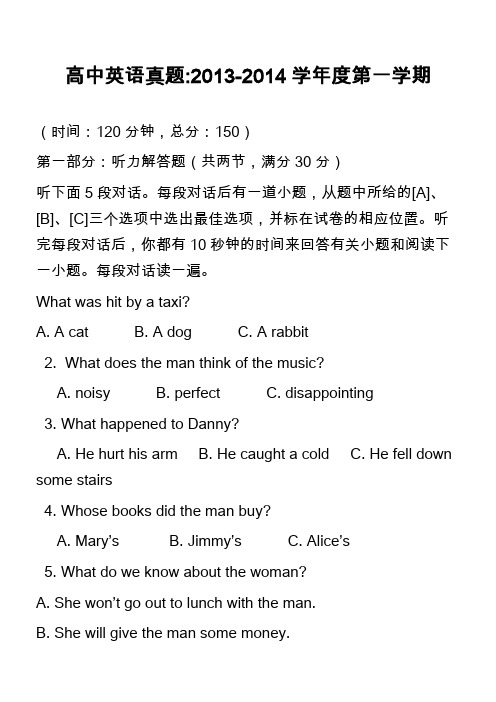
高中英语真题:2013-2014学年度第一学期(时间:120分钟,总分:150)第一部分:听力解答题(共两节,满分30分)听下面5段对话。
每段对话后有一道小题,从题中所给的[A]、[B]、[C]三个选项中选出最佳选项,并标在试卷的相应位置。
听完每段对话后,你都有10秒钟的时间来回答有关小题和阅读下一小题。
每段对话读一遍。
What was hit by a taxi?A. A catB. A dogC. A rabbit2. What does the man think of the music?A. noisyB. perfectC. disappointing3. What happened to Danny?A. He hurt his armB. He caught a coldC. He fell down some stairs4. Whose books did the man buy?A. Mary’sB. Jimmy’sC. Alice’s5. What do we know about the woman?A. She won’t go out to lunch with the man.B. She will give the man some money.C. She wants to buy the man a meal.第二节听下面5段对话或独白,每段对话和独白后有几个小题,从题中所给的A B C三个选项中选出最佳选项,并标在试卷的相应位置,听每段对话和独白前,你将有时间阅读各个小题,每小题5秒钟;听完后,各小题给出5秒钟的作答时间。
每段对话和独白读两遍。
听第6段材料,回答第6、7题。
6. What was the weather like yesterday?A. sunnyB. rainyC. windy7. What is the man going to do?A. Prepare some food.B. Get the tent ready.C. Get the bikes ready.听第7段材料,回答第8、9题8. Where are the speakers?A. in a shopB. at homeC. in the street9. What does the woman think of the carrots?A. They are fresh.B. They are too old.C. They can make a great dessert.听第8段材料,回答第10至12题10. What is true about the library?A. newspapers can be taken out.B. It is open from 8: 00 a.m. to 10:00p.m.C. Magazines are on the second floor.听第9段材料,回答第13至16题.13. Who is the woman?A. The man’s auntB. The man’s sisterC. The man’s m other14. When did the man last eat?A. one hour ago.B. Two hours agoC. Three hours ago.15. What does the man think of iPads?A. They are useless to herB. They are easy to use.C. They’re too difficult for her16. What can we learn from the woman?A. She knows little about SkypeB. She has never surfed the InternetC. She uses computers a lot for her work.听第10段材料,回答第17至20题.17. What about is mentioned in the talk?A. There is lots of snow.B. It can be rainy for a whole day.C. The weather changes a lot during the day.18. When do shops close on weekends?A. 5:30p.mB. 5:00p.mC. 4:30p.m19. Where can people go at any time?A. banksB. parksC. museums20. Which kind of transportation is discussed in detail?A. trainB. taxiC. Bus第二部分英语知识运用(共两节,满分35分)第一节:单项填空(共15小题;每小题1分,满分15 分)从A、B、C、D四个选项中,选出可以填入空白处的最佳选项。
高中英语真题-2013—2014学年高一3月质量检测_2

高中英语真题:2013—2014学年高一3月质量检测第一部分:听力(共两节,满分30分)第一节(共5小题,每小题1.5分,满分7.5分)听下面5段对话。
每段对话后有一个小题,从题中所给的A、B、C三个选项中选出最佳选项,并标在试卷的相应位置。
听完每段对话后,你都有10秒钟的时间来回答和阅读下一小题。
每段对话仅读一遍。
1. Where does this conversation take place?A. At a hospital.B. At a department store.C. At a restaurant.2. How much is the food and drink?A. $2.65.B. $2.75.C. $2.95.3. What's the man doing? A. Watching TV. B. Turning down the TV.C. Answering the phone.4. According to the man, what does he like to do if possible?A. To visit museums.B. To make a good plan.C. To vi sit the .5. What news did the woman get from the man?A. Sam will leave very soon.B. Sam's sister will leave for ver y soon.C. Sam' s sister will leave for very soon.第二节(共15小题,每小题1.5分,满分22.5分)听下面5段对话或独白。
每段对话或独白后有几个小题,从题中所给的A、B、C三个选项中选出最佳选项,并标在试卷的相应位置。
听每段对话或独白前,你将有时间阅读各小题,每小题5秒中;听完后,各小题将给出5秒钟的作答时间。
